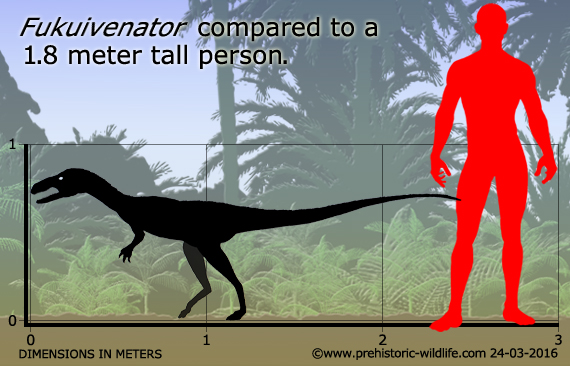


Fukuivenator

Name:
Fukuivenator
(Fukui Prefecture hunter).
Phonetic: Fu-ku-e-ven-ah-tore.
Named By: Y. Azuma, X. Xu, M. Shibata,
S. Kawabe, K. Miyata & T. Imai - 2016.
Classification: Chordata, Reptilia, Dinosauria,
Saurischia, Theropoda, Coelurosauria, Maniraptoriformes.
Species: F. paradoxus
(type).
Diet: Carnivore/omnivore?
Size: Roughly estimated to be about 2.45 meters
long.
Known locations: Japan, Fukui Prefecture -
Kitadani Formation.
Time period: Barremian/Aptian of the Cretaceous.
Fossil representation: Skull and almost complete
post cranial skeleton.
Named
early in 2016, Fukuivenator has quickly become
recognised as one of
the more bizarre dinosaurs. We know that Fukuivenator
is what is
termed a coelurosaur, though the genus displays not only a mix of
primitive and advanced features, but also a combination of
characteristics of maniraptoran and ornithomimid
dinosaurs. It is
quite possible that these features may have developed as a case of
convergent evolution.
In
addition to this mix of features, Fukuivenator
also has a
proportionately longer neck than that seen in most predatory theropod
dinosaurs and heterodont teeth, some of which are flattened into
cutting blades similar to some plant eating dinosaurs. What is
certain is that Fukuivenator evolved from predatory
meat eating
dinosaurs, but was already on the path to eating plants. Without
stomach contents, it is impossible to say which idea is correct,
but we can say that Fukuivenator was capable of
eating and digesting
meat, and potentially capable of foraging upon plants as well.
With
more and more dinosaurs being named after the Fukui Prefecture of Japan
great care must be taken not to confuse Fukuivenator
with Fukuisaurus,
an ornithopod dinosaur, Fukuititan,
a sauropod, and especially Fukuiraptor,
a predatory
theropod dinosaur.
Further reading
- A bizarre theropod from the Early Cretaceous of Japan highlighting
mosaic evolution among coelurosaurians. - Scientific Reports,
6(20478). - Y. Azuma, X. Xu, M. Shibata, S.
Kawabe, K. Miyata & T. Imai - 2016.
Random favourites
 |
 |
 |
 |




